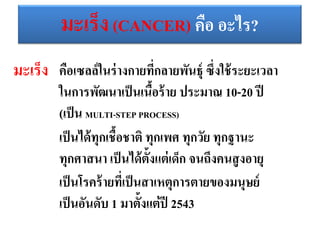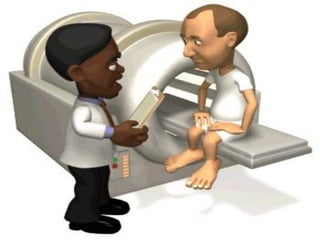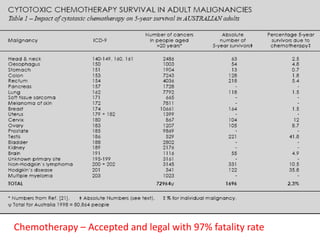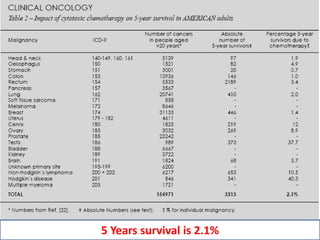มะ�ร็งการรักษาและการป้องกัน1
- 1. มะเร็ ง : การรั กษาและการป้ องกัน YES
- 2. มะ�ร็ง (CANCER) คือ อะไร? มะ�ร็ง คือเซลล์ในร่ างกายทีกลายพันธุ์ ซึ่งใช้ ระยะเวลา ่ ในการพัฒนาเป็ นเนือร้ ายตประมาณ 10-20 ปี ้ ดี ่ อผู้ป่วย มะ�ร็ง (เป็ น MULTI-STEP PROCESS) เป็ นได้ ทุกเชื้อชาติ ทุกเพศ ทุกวัย ทุกฐานะ ทุกศาสนา เป็ นได้ ต้งแต่ เด็ก จนถึงคนสู งอายุ ั เป็ นโรคร้ ายทีเ่ ป็ นสาเหตุการตายของมนุษย์ เป็ นอันดับ 1 มาตั้งแต่ ปี 2543
- 3. ปัจจัยทีทาให้ เกิดมะ�ร็ง ่ 1.พันธุกรรม 2.สารพิษ สารเคมี เช่ นจากแชมพู่ อสบูวย ่องสาอางค์ ดีต ผู้ป่ ่ เครื มะ�ร็ง 3.รังสี ต่าง ๆ เช่ นรังสี จากดวงอาทิตย์ โทรศัพท์ มอถือ ื คลืนไมโครเวฟ ทีวี คอมพิวเตอร์ รังสี เอกซ์ เรย์ ่ 4.เชื้อไวรัส แบคทีเรีย เช่ นแบคทีเรีย HERICOBACTOR PYLORI ทาให้ เกิดมะ�ร็งต่ อมนาเหลือง ไวรัสตับอักเสบ บี ทาให้ เป็ น ้ มะ�ร็งตับ
- 4. 5.ฮอร์ โมน ทั้งทีปนเปื้ อนมาทางการบริโภคเนือสั ตว์ โดยเฉพาะ ่ ้ เนือแดง หรือทีมในพืชผักบางประเภท ทีบางครั้งบริโภคมาก ้ ่ ี ่ เกินไป เกินความสามารถทีร่างกายจะขับออกได้ ่ 6.อนุมูลอิสระ ทาให้ เซลล์ กลายพัดีน่ธุผู้ป่ด้วย ตอ ์ ไ มะ�ร็ง มะ�ร็งในระดับ ต่ าง ๆ 4 ระดับ STAGE 1 ขนาดไม่ เกิน 2 เซนติเมตร STAGE 2 ขนาดไม่ เกิน 5 เซนติเมตร STAGE 3 เซลล์ มะ�ร็งลามไปทีต่อมนาเหลือง ่ ้ STAGE 4 เซลล์ มะเร็ งลามข้ ามไปสู่ อวัยวะอืน ๆ ่
- 5. ความจริง : เราทุกคนล้วนมีเซลล์มะ�ร็งอยู่ในร่ างกาย แต่ เซลล์ มะ�ร็งเหล่ านีจะไม่ ถูกตรวจพบ จากการตรวจ ้ จนกระทังมันได้ กระจายตัวไปมากกว่ า หลายพันล้ านเซลล์ ่ ดังนั้น เมือแพทย์ บอกกับผู้ป่วยมะ�ร็งว่ า ไม่ พบเซลล์ มะ�ร็งใน ่ ร่ างกาย หลังจากทีทาการบาบัดรักษาแล้ ว จึงหมายถึง ่ ว่ า การตรวจหาไม่ สามารถทีจะตรวจพบเซลล์ มะ�ร็งได้ ่ เนื่องจากเซลล์ มะ�ร็งยังมีปริมาณไม่ มากพอ ทีจะถูกตรวจพบ ่ ได้ เท่ านั้นเอง
- 6. ทีสาคัญทีสุดอีกประการหนึ่ง : ่ ่ เพราะว่ าระบบภูมคุ้มกันทีทรงประสิ ทธิภาพในร่ างกายของ ิ ่ เราได้ ตรวจพบ ก่ อนทีเ่ ซลล์ มะ�ร็งนีจะขยายตัวมาก ้ จนกลายเป็ นเนือร้ าย โดยการเข้ าไปจัดการทาลาย ้ ได้ ทนท่ วงที จึงทาให้ ไม่ เป็ นมะ�ร็ง ั แต่ เมือใดก็ตามทีระบบภูมคุ้มกันไม่ สามารถทีจะต่ อสู้ ได้ ่ ่ ิ ่ เมือนั้นเอง ก็จะทาให้ เกิดมะ�ร็งขึนในร่ างกายได้ ่ ้ ดังนั้นเพือเป็ นการปองกันทีต้นเหตุ เราจึงต้ องดูแลระบบ ่ ้ ่ ภูมคุ้มกันของเราให้ แข็งแรงอยู่เสมอ เพราะถ้ าเราดูแลภูมคุ้มกัน ิ ิ ของเราดี ระบบภูมคุ้มกัน ก็จะกลับมาดูแลเราเอง ิ
- 7. สั ญญาณอันตราย 7 ประการ 1. แผลเรื้อรังรักษาไม่ หาย 2. เป็ นไฝ ก้ อน ตุ่ม โตขึนเรื่อดียต่อผู้ป่วย ้ ๆ 3. เสี ยงแหบ เจ็บคอ กลืนลาบาก ง มะเร็ 4. ไอเรื้อรัง มีเสมหะ ปนเลือด 5. ตกขาว ตกเลือดมากผิดปกติ ปวดในช่ องเชิงกราน 6. ปัสสาวะเป็ นเลือด ปัสสาวะขัด ปัสสาวะไม่ ออก 7. อุจจาระเป็ นมูกเลือด ท้ องผูก สลับท้ องเสี ย
- 8. การป้ องกันมะ�ร็ง 1. ความรู้ ด้านโภชนาการ เช่ น การปฏิบัตตามหลัก 5อ.1พ. ิ 2. ความรู้ เกียวกับมะ�ร็ง ่ ดีต่อผู้ป่วย 3. ตรวจร่ างกาย และสั งเกตุความผิมะ�ร็ง ในร่ างกาย ดปกติ 4. หลีกเลียงปัจจัยเสี่ ยงต่ อการเกิดมะ�ร็ง ่ 5. การดูแลระบบภูมคุ้มกันให้ สมดุลอยู่เสมอ เพราะภูมคุ้มกัน ิ ิ คือสิ่ งทีธรรมชาติมอบให้ แก่ เราตั้งแต่ แรกเกิดเปรียบเสมือนทั้ง ่ แพทย์ ประจาตัว และกองทหารในร่ างกายเราเอง การดูแลตัวเองทีดทสุด จึงเป็ นการกันไว้ ดกว่ าแก้ ่ ี ี่ ี “PREVENTING IS BETTER THAN HEALING”
- 9. การรักษามะ�ร็งในปัจจุบัน 1. การผ่ าตัด ดีต่อผู้ป่วย มะ�ร็ง 2. การรักษาด้ วยรังสี บาบัด 3. การรักษาด้ วยเคมีบาบัด
- 10. การผ่ าตัด เป็ นการรักษาเฉพาะที่ การผ่ าตัดเพือนาเซลล์ มะ�ร็งออก ่ จากร่ างกาย และปองกันไม่ ให้ ขยายไปสู่ อวัยวะอืน ๆ ้ ่ ดีต่อผู้ป่วย ผู้ป่วยทีจะรับการผ่ าตัดจะต้มะ�ร็งร่างกายทีแข็งแรงในระดับ ่ องมี ่ ทีแพทย์ วนิจฉัยแล้ วว่ า สามารถรับการรักษาวิธีนีได้ ่ ิ ้ การผ่ าตัด ผู้ป่วยมีความเสี่ ยงต่ อการติดเชื้อในกระแสเลือด สู งมาก ก่ อนการผ่ าตัด ผู้ป่วยต้ องดูแล และบารุงร่ างกายให้ แข็งแรง ให้ มากทีสุด ก่ อนรับการรักษา ่
- 11. การรั กษาด้ วยรั งสีบาบัด (Radiation Therapy) ใช้ ลาแสงเข้ มข้ นของรังสี เพือ ่ ฆ่ าเซลล์ มะ�ร็ง ซึ่งลาแสงเข้ มข้ นของรังสี อาจจะทาร้ ายเซลล์ ทดได้ ด้วย ี่ ี
- 13. การรั กษาด้ วยเคมีบาบัด (Chemotherapy ) โดยการใช้ ยาเคมีเพือ ่ ฆ่ าทาลายเซลล์ มะ�ร็ง และหยุดยั้งไม่ ให้ เซลล์ มะ�ร็งกระจายตัว การทาเคมีบาบัด อาจใช้ ยาตัวเดียว หรือ หลาย ๆ ตัว ซึ่งอาจให้ ทางการกิน หรือ ฉีด ยาจะไหลผ่ านกระแสเลือด และกระจายไป ทัวร่ างกาย แต่ ยาเคมีบาบัด นอกจากทาลายเซลล์ มะ�ร็งแล้ ว ่ ก็ยงสามารถทาร้ ายเซลล์ ทดได้ เช่ นกัน จึงทาให้ ผ้ ูป่วยได้ รับ ั ี่ ี ผลข้ างเคียงจากการรักษา เช่ น ผมร่ วง อาเจียน ผิวไหม้
- 15. New Anticancer Treatment: การบาบัดด้ วยภูมิคุ้มกัน(Immunotherapy) หรือเรียกว่ าการบาบัด ด้ วยวิธีชีวภาพ (BIOLOGICAL THERAPY) เปาหมายคือกระตุ้นให้ ้ ระบบภูมคุ้มกันของ ิ ผู้ป่วยมะ�ร็ง ให้ สามารถต่ อสู้ กบโรคร้ ายได้ เอง ซึ่งปัจจุบัน(2555) กาลังอยู่ใน ั ระหว่ างการวิจัยพัฒนา โดยการใช้ วคซีนในการรักษา ั
- 16. แพทย์ ผู้มชื่อเสี ยงของออสเตรเลีย ี ได้ วพากษ์ วจารณ์ การรักผู้ป่วย ิ ิ มะ�ร็งด้ วยเคมีบาบัด ว่ าแทบไม่ มี ประโยชน์
- 18. CHEMOTHERAPY IS ALMOST USELESS Study Published In The Journal Clinical Oncology Authors (1) Associate Professor Graeme Morgan (Radiation oncologist) (2) Professor Robyn Ward (Medical oncologist) (3) Dr. Michael Barton (Radiation oncologist)
- 19. Chemotherapy – Accepted and legal with 97% fatality rate
- 20. 5 Years survival is 2.1%



















